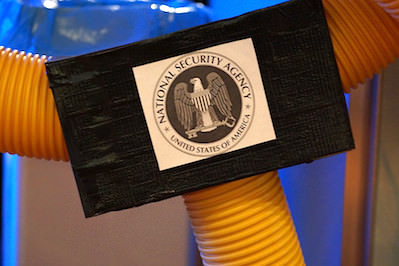Obama Expands Ability of National Security Agency to Share Data
The new rules open private information to 16 other agencies, including the FBI, the Drug Enforcement Administration and the Department of Homeland Security.
The Obama administration announced new rules last week that will allow the National Security Agency to share vast amounts of private data with 16 other agencies.
Those agencies include the FBI, the Drug Enforcement Administration and the Department of Homeland Security. The data is gathered without warrant, court orders or congressional authorization.
Alex Emmons reported at The Intercept:
The change was in the works long before there was any expectation that someone like Trump might become president. The last-minute adoption of the procedures is one of many examples of the Obama administration making new executive powers established by the Bush administration permanent, on the assumption that the executive branch could be trusted to police itself.
Executive Order 12333, often referred to as “twelve triple-three,” has attracted less debate than congressional wiretapping laws, but serves as authorization for the NSA’s most massive surveillance programs — far more than the NSA’s other programs combined. Under 12333, the NSA taps phone and internet backbones throughout the world, records the phone calls of entire countries, vacuums up traffic from Google and Yahoo’s data centers overseas, and more.
In 2014, The Intercept revealed that the NSA uses 12333 as a legal basis for an internal NSA search engine that spans more than 850 billion phone and internet records and contains the unfiltered private information of millions of Americans.
In 2014, a former state department official described NSA surveillance under 12333 as a “universe of collection and storage” beyond what Congress has authorized. …
But this massive database inevitably includes vast amount of [Americans’] communications — swept up when they speak to people abroad, when they go abroad themselves, or even if their domestic communications are simply routed abroad. That’s why access was previously limited to data that had already been screened to remove unrelated information and information identifying U.S. persons. The new rules still ostensibly limit access to authorized foreign intelligence and counterintelligence purposes — not ordinary law enforcement purposes — and require screening before they are more widely shared. But privacy activists are skeptical. …
Nathan White, legislative manager for the digital rights group, Access Now, wrote in an email: “One of the fundamental tenets of privacy among the intelligence community has been that when the collection is large on the front end, you need tighter minimization procedures on the back end.”
He continued: “This decision will be added to the timelines of the most significant expansions of domestic surveillance in the modern era.”
—Posted by Alexander Reed Kelly
Independent journalism is under threat and overshadowed by heavily funded mainstream media.
You can help level the playing field. Become a member.
Your tax-deductible contribution keeps us digging beneath the headlines to give you thought-provoking, investigative reporting and analysis that unearths what's really happening- without compromise.
Give today to support our courageous, independent journalists.






You need to be a supporter to comment.
There are currently no responses to this article.
Be the first to respond.